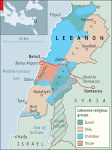Amid all this chaos, the workers were forgotten, their economic demands silenced and the workers' movement has become more divided than ever with pro and anti government unions. None of the parties battling in the streets have any solution for the workers' plight. They only care about their own interests and plans. The Lebanese masses should turn against all the sectarian, chauvinist and bourgeois parties who not only cause economic hardship, but who consciously turn the Lebanese against each other so that they stay in their place, while the elite at the top can advance their plans and projects at the expense of people's security.Faran points us back toward the original event scheduled for Wednesday, May 7th, when clashes first broke out--a broad strike among Lebanese workers for an increase in the minimum wage from 300,000 LL (US$200) to 900,000 LL ($600) per month. As Faran explains, the strike was thwarted by the opposition's exploitation of the event for their own interests and by the civil disobedience and violence that followed.
I didn't mention this strike in my original post in which I attempted to explain the context of the political conflict precisely because it is incorrect to conflate, in general, the working class movement in Lebanon with Hezbollah, and in particular, the strike with the chaos that followed. Yet, many media accounts of the situation paint the strike as Hezbollah's first act of aggression. On the contrary, I think Faran is right to see the recent actions of both the government and the opposition as acts of aggression against the strike (and, of course, against each other).
Hezbollah's populist politics and impressive record of providing for the communities it governs does attract a sizable portion of Lebanon's poor, particularly those who are Shia. But they do not speak for whole of the working class. AUB's staff, for instance, engaged in a sympathy strike last Wednesday, and they are far from unified in their political or sectarian affiliations. There were also many workers who were planning to strike but backed out of the labor demonstration as soon as Hezbollah and its allies jumped aboard.
The need for an increase in the minimum wage (the government, as planned, did raise it to 500,000 LL [US$333]) and for the empowerment of Lebanon's workers more generally is an urgent matter. According to the International Poverty Center, 28.5% of Lebanese live in poverty and 8% survive under conditions of extreme poverty. Lebanon's Shia community, in addition to many foreign workers (including, most significantly, Palestinians, Syrians, Sri Lankans, and Ethiopians), are disproportionately represented in these figures and are often the victims of work-related discrimination and violence. Moreover, poverty will in all likelihood rise in the coming years if the current government succeeds in its efforts to bring Lebanon into the World Trade Organization and privatize what is left of the state-owned industries. The rise of several multi-million dollar luxury apartment buildings and the consequent gentrification of a growing number of Beirut's neighborhoods puts even greater pressures on the poor.
The hope, then, for many people, is that Hezbollah can emerge as the champion of the impoverished and oppressed in Lebanon and the broader region. But many on the country's left are not optimistic. As Faran puts it,
Hezbollah and the rest of the opposition have no economic alternative for Lebanon. In fact they have repeatedly stated that their problem is with the parties governing and not with their policies. They consider the governing parties to be corrupt ‑ which is true ‑ but conveniently cover up the fact that they themselves are also corrupt. A major opposition party, Amal, has the exact same economic policy and is involved in the same level of corruption as the Future Movement, while Hezbollah's economic policy is a populist one that would very quickly become openly pro-capitalist as soon as they gain power. The plight of the Iranian workers shows very clearly the such systems offer no alternative to the deprived classes (the Islamic fundamentalist regime in Iran can be considered as Hezbollah's Godfather).Therefore, Faran continues,
Unless people focus on their common interest in overthrowing all the political class and present an alternative that really has the people's well being as the main goal, war after war will continue to rock Lebanon. Unless the left stops tail-ending this or that bourgeois party or the fundamentalists, the Lebanese masses will continue to count their dead.On the one hand, then, we could see this conflict as resulting in both destructive violence and a further regression of the country's working class politics. But on the other, insofar as all the political players are (in many people's opinions) showing themselves to be horribly irresponsible leaders, perhaps this situation could bring about, as Faran hopes, an alternative, working class-centered, non-violent political movement. Perhaps.

No comments:
Post a Comment